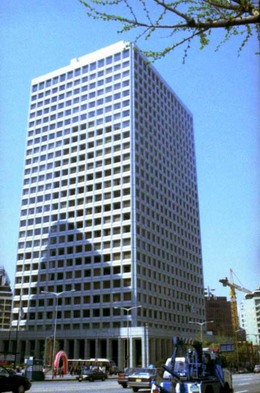Posted on : Feb.16,2007 15:10 KST
Modified on : Feb.17,2007 14:10 KST
 |
|
Headquarters of Samsung group
|
Research charts a shift from the solely compensation-based job search
"Despite the stability and high social status obtained by working at a large company, I was under a tight schedule and couldn’t find time for myself," said Mr. Lee, 35, who recently quit work at one of Korea’s major conglomerates and switched to a smaller IT company. "My income declined without a promotion in job title, but I am still satisfied that I have more personal control in my work."
Most workers in South Korea change their jobs mainly due to psychological factors and dissatisfaction with the overly structured nature of corporate culture, a move that breaks with the past practice of seeking financial stability at whatever cost, psychological or otherwise.
According to a survey conducted on 357 workers aged between 20 and 49 by the Hyundai Economic Research Institute, 35.8 percent said that they changed jobs after finding it difficult to personally develop at their previous workplace. Of those surveyed, 20.2 percent said they had left their prior work due to feeling underappreciated.
In contrast, only 21.1 percent said that income was a reason for the job switch, while only 3.2 percent cited job insecurity as a deciding factor.
For their future careers, the survey showed that 31.6 percent preferred jobs in which they are interested personally and 24.4 percent sought jobs that could offer self-improvement.
Some large companies have already introduced incentive systems designed to enhance the feeling of achievement among their employees, rather than the usual cut-and-dry financial compensation.
Samsung Electronics, for example, designates a mentor for each employee. For high-performing workers, executives or even presidents assume the role. POSCO, Hyundai Motor Corp., and Kia Motors also operate a "career development program" to prevent their workers from leaving for other companies.
However, small and medium-sized enterprises do not have such systems in place. According to the survey, 61.6 percent of SMEs have no "job turnover prevention programs;" instead, many of them persuade their workers to stay mainly by raising their salary.
Mr. Lee, who left a large firm to work at a smaller IT company, said, "Colleagues at my previous company tried to persuade me to stay, saying that nothing would change even if I switched jobs. Then came counselling by the personnel department. But neither group remained persistent, probably because there are so many people right now making the same decision I did."
An official with SK Communications’ personnel department said that when push comes to shove, "there is no other choice but to offer a promotion or financial compensation to dissuade an employee from quitting."
Kim Dong-gyun, a human resources department executive at Humax, a medium-sized electronics and communications firm, said, "These days, the younger generation dislikes rigidly organized corporate culture. Companies need to accept such diversity of opinion in order to survive in a globalized era. The problem is that small and medium-sized businesses do not have a program designed to instill satisfaction among their workers."
Lee Cheol-seon, a researcher at Hyundai Economic Research Institute, said that the financial crisis in the late 1990s contributed to the flexibility of the labor market, but the high job turnover rate serves as a drag on companies’ long-term competitiveness. "It is the result of companies’ focus on financial compensation," Lee said, "rather than on measures to alleviate dissatisfaction and nurture personal development among workers."
Please direct questions or comments to [englishhani@hani.co.kr]

